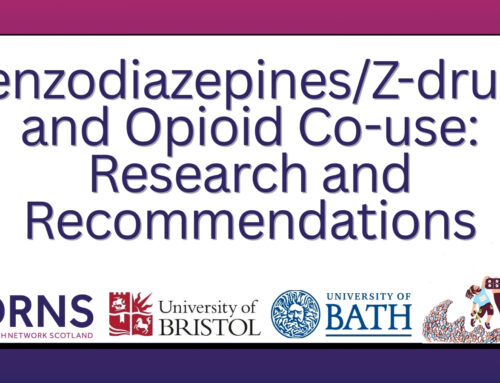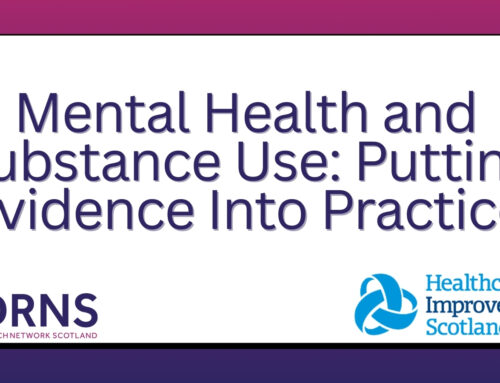Event report: DRNS Conference May 2022

In May 2022, DRNS was proud to deliver its 3rd Annual Conference. Attendees came from a variety of backgrounds and locations across the globe, and all were unified by their interest in drugs research. The theme of this conference was one which had great resonance for us all: ‘Complex lives and complex systems: untangling the complexity through drugs research’. With an opening address by Angela Constance (MSP, Minister for Drug Policy), the event was then chaired by Duncan Hill, DRNS Co-convenor & Specialist Pharmacist in Substance Misuse, NHS Lanarkshire, and Dave Liddell, CEO of the Scottish Drugs Forum. The packed programme featured four keynote speakers of international repute, an array of shorter research presentations from teams across the field, a panel discussion, and an opportunity for online networking.
Conference Opening Address
Angela Constance, MSP, Minister for Drug Policy
Angela Constance opened the conference, reiterating the Scottish Government’s National Mission to reduce drug-related deaths, saying that “to reach our National Mission goal, we value the significant contribution that those working in drug research in Scotland and beyond make towards understanding drug use, and we recognise that our work requires the input of quality research, such as that which is being presented today”.
Morning session. Keynote presentation 1: Addressing intimate partner abuse perpetration by men in treatment for substance use
Professor Gail Gilchrist, Kings College London
During this keynote we learned that men living with problematic substance use have a much higher incidence of violence toward others, yet they are often refused access to interventions addressing violence. In Professor Gilchrist’s presentation about her NIHR-funded research, we learned that intoxication is rarely the only reason for violence. Instead, the reasons are complex, and related to gender imbalance, financial problems, and previous adversity. Delegates were introduced to ADVANCE, a strengths-based, trauma-informed approach which recognises the complexity of intimate partner violence, which is now being developed as an online intervention.
Morning session. Keynote presentation 2: Drug treatment as a tool of empowerment
Mat Southwell, European Network of People who Use Drugs (EuroNPUD)
The DRNS conference team wanted to ensure that the floor was shared with people who had lived and living experience of problematic drug use. Accordingly, Mat Southwell from The European Network of People who Use Drugs (EuroNPUD) delivered a thought-provoking and impassioned personal reflection of his ongoing experiences of drug use, his engagement with services, and the ups and downs of his subsequent activism. He had strong words for the amplification of the lived, and importantly the living experience voice, saying “when the feedback is invited and received from a place of genuine enquiry and commitment to professional development, then this can be a rich and mutually beneficial experience.”
Research Bites sessions
Themed “Research Bites” made it possible to showcase the breadth and excellence of the work being done to address an aspect of the conference theme of “Complexity”. At each session, delegates were able to view a series of pre-recorded videos prepared by study teams or individuals, and sessions concluded with a live Q&A involving all presenters as they responded to questions from delegates.
Group 1: Drug-Related Deaths
Chair: Professor Catriona Matheson, DRNS Co-Convenor
- How feasible and accessible is a community pharmacy delivered take home naloxone (THN) intervention for patients prescribed high-strength opioids for chronic non-cancer pain? Findings from the POOR 2 study. Dr Fiona Mercer, University of Stirling
- Benzodiazepines and Z-drugs prescriptions trends over time among the Aberdeen Children of the 1950s and chronic prescriptions associated characteristics. Hadah Alkhaldi, University of Aberdeen
- Identifying typologies of drug-related death using linked, administrative health care data. Catherine Arkwright, University of Dundee
- Preventing drug-related deaths: The role of GPs and primary care. Dr Katie Colliver, University of the West of Scotland
- Co-morbidity among 4,451 drug-related deaths in Scotland 2009-2016: A network analysis of 230 health and social conditions. Dr Rosie Seaman, University of Glasgow
- A mixed methods evaluation of peer-to-peer naloxone training and supply. Dr Matthew Smith, Glasgow Caledonian University
Group 2: People with Complex Lives
Chair: Dr Hannah Carver, DRNS Co-Deputy Convenor
- “We are people with complex issues and challenging histories” – Exploring the embodied recoveries of mid-life and older women in substance use recovery. Dr April Shaw, Kings College London
- ‘Holding On’ – Supporting families with highly complex and ‘tangled’ lives. Justina Murray, Scottish Families Affected by Alcohol and Drugs
- “It maybe doesn’t seem much, but to me it’s my kingdom”: Staff and client experiences of Housing First in Scotland. Dr Joanna Miler, University of Stirling
- “What makes the difference is that s/he understands”: findings from the SHARPS feasibility mixed-methods study. Dr Rebecca Foster, University of Stirling
- Mothers, caregivers and young people affected by drug use: Weaving whole approaches. Joyce Nicholson, University of Glasgow
- The detection, prevalence and emerging models of use of novel benzodiazepine-type drugs in prisons. Victoria Marland, University of Dundee
Group 3: Methods & Models
Chair: Elinor Dickie, Public Health Scotland
- Planet Youth, Icelandic Model in Highland. Eve Macleod, NHS Highland
- Untangling the complexity of practitioner-parent relations: Methodological reflections on reformulating research during COVID-19 around parents who use drugs. Dr James Todd, University of Stirling
- Exploring complexities of stigma surrounding substance use disorders in Scottish local policy-making context: A review and thematic analysis of Alcohol and Drug Partnerships’ strategies. Robin Falconer, University of Stirling
- Developing an intervention to manage benzodiazepine dependence and high-risk use in the context of escalating drug related deaths. Dr Karen Berry, University of Stirling “You ask for peer research, you get peer research”: Reflections on the creation of a peer research initiative. Josh Dumbrell, Drugs Research Network Scotland
Group 4: Treatment
Chair: Maggie Page, Scottish Government Drugs Policy Division
- What works?: User perspectives on Stimulant Ant/Agonist Therapy (STAT) included in BC’s Clinical Guidelines for Safe Prescription Alternatives. Juls Badau, University of British Columbia
- Psychedelic Assisted Therapy for problematic substance users in Scotland. The role of the Scottish Psychedelic Research Group (SPRG). Dr Anna Ross, University of Edinburgh
- Greenspace programmes for supporting mental health and people with problem substance use. Dr Wendy Masterton, University of Stirling Residential rehabilitation in Scotland: Perspectives from alcohol and drug partnerships, rehab providers and people with lived experience. Dr Laura Roe, Scottish Government
- Understanding the Contextual Factors that Impact on Effective Provision of Medication Assisted Treatment (MAT) and Needle and Syringe Programmes (NSP) in the UK: A multi-method study and realist evaluation of what works, for whom and how. Peter McCulloch, University of Dundee
- Medication Assisted Treatment: Service evaluation of people’s experience of accessing MAT in 6 health board areas across Scotland. Katy Macleod, Scottish Drugs Forum
Group 5: Care Pathways & Systems
Chair: Dr Louise Marryat, University of Dundee
- A complexity science approach to measure “joined up working”: Collaboration networks for substance use, sexual health and blood borne virus service provision. Dr Mark McCann, University of Glasgow
- Feasibility of cervical cytology screening in an addiction setting. Dr Edmund Stewart, NHS Lanarkshire
- COVID related disruption to formal and informal networks of people who use substances or treatment services. Katy MacLeod, Scottish Drugs Forum
- Exploring complex antenatal care pathways for women who use opioids in pregnancy. Thomas Hughes, University of Dundee
- A qualitative exploration of three hypothetical models of drug checking service delivery in a Scottish content. Danilo Falzon, University of Stirling Understanding the drugs and alcohol workforce in Scotland. Joshua Bird, Scottish Government
Afternoon session. Keynote presentation 3: Creating evidence-informed public policies addressing addiction
Professor Keith Humphreys, Stanford University
With a CV demonstrating his longstanding influence at the higher echelons of policy making, Professor Humpreys took the audience through the challenges of translating evidence into policy. “There really isn’t such a thing as evidence-based policy”, he said “I know people use that term all the time but it’s a myth, but there is evidence-informed policy”. He articulated the challenges of this translation process using three case studies, pointing out that across his examples, “evidence alone never carries the day […] evidence matters an awful lot, it just can’t carry all the weight by itself. What happens is that when the values in politics create a window, evidence becomes critical for taking maximal advantage of them”.
Afternoon session. Keynote presentation 4: Drug checking: Where the research is service, and the service is research
Dr Bruce Wallace, University of Victoria, British Columbia
Dr Wallace opened his talk with a personal reflection about the complexity we were all present to consider. “I really appreciate being at this event about complexities,” he said, “it’s what I think keeps me up at night, and also keeps me working, keeps me passionate about my work and what I want to keep working on, thinking about, and doing better at.” He went on to talk about his current work looking at a drug-checking programme in Canada, and in doing so, noted the links between harm reduction evidence and grass roots and activism narratives.
Afternoon session. Panel discussion: How to maximise the role of evidence in drug policy
Towards the end of a long but fascinating day, all keynote speakers were joined by Orlando Heijmer-Mason, Head of Drugs Policy, Scottish Government, forming a panel to discuss how to maximise the role of evidence in drug policy. Delegate questions were put to the panel and lively discussion ensued around some of the thorny questions which vex contemporary researchers. For instance, when responding to the question “what’s more important, evidence or politics“, Mat Southwell suggested that “we need to use research boldly and see the interaction between activism and research“. Expanding on this point, Orlando Heijmer-Mason added, ” if the evidence appears to contradict the prevailing values in the political discourse around it, then you’re not going to get very far, and then perhaps activism and being less collaborative might be a more productive route“.
Thoughts from Hazel @TeamDRNS
This report has been a whistle-stop tour through the highlights of the day, but if you are keen to learn more, you will be pleased to know that members can access videos recordings of the day through the DRNS membership portal. The membership portal also hosts forum boards. By posting on those forums, you are welcome to continue conversations, or to share your thoughts about what was discussed on the day. Membership is free and gives you access to this and other useful content from DRNS. Sign up here.
Since the pandemic, I’ve accessed lots of online events and the DRNS conference left me reflecting on those experiences. While I’m relieved that the internet has made it possible to have ongoing access to conferences, training, and webinars, I’ve concluded that the virtual space can often have a very different energy. It must sometimes seem to online presenters that they are talking to an empty room, but this conference felt very different. The engagement at the DRNS conference was phenomenal, with questions and comments rolling in throughout the day. It made it feel very lively and I loved that, but what was it about the DRNS conference that made it feel so engaging? For me, it boils down to the special blend of passionate and dedicated people involved. Inspiration and energy breeds inspiration and energy. It is for that reason that I must give special thanks to our wonderful and inspiring speakers, and especially to the delegates for all their fabulous questions and supporting comments. It’s important too, to mention Jess @Team DRNS and Steve and Adrianne at Jump whose supreme organisation and tech skills before and during the conference ensured that inspiration and energy was able to rule the day.






